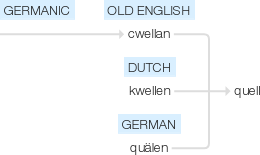Quell
Old English cwellan ‘kill’, of Germanic origin; related to Dutch kwellen and German quälen .
wiktionary
From Middle English quellen, from Old English cwellan(“to kill”), from Proto-Germanic *kwaljaną(“to make die; kill”). Cognate with German quälen(“to torment; agonise; smite”), Swedish kvälja(“to torment”), Icelandic kvelja(“to torture; torment”). Compare also Old Armenian կեղ(keł, “sore, ulcer”), Old Church Slavonic жаль(žalĭ, “pain”). See also kill, which may be its doublet.
From Middle English *quelle (suggested by the verb quellen(“to well up; gush forth”)), from Old English cwylla, *cwielle(“spring; source”), from Proto-Germanic *kwellǭ(“well; spring”). Compare German Quelle.
etymonline
quell (v.)
Middle English quellen "to kill" (a person or animal), from Old English cwellan "to kill, cause to die; murder, execute," from Proto-Germanic *kwaljanan (source also of Old English cwelan "to die," cwalu "violent death;" Old Saxon quellian "to torture, kill;" Old Norse kvelja "to torment;" Middle Dutch quelen "to vex, tease, torment;" Old High German quellan "to suffer pain," German quälen "to torment, torture"), from PIE root *gwele- "to throw, reach," with extended sense "to pierce."
The original sense is obsolete; the milder sense of "suppress, extinguish, cause to cease," developed by c. 1300; that of "reduce to peace or subjection" is by 1560s. Compare quail (v.). "The common identification of quell with kill (1), of which it is said to be the earlier form, is erroneous" [Century Dictionary]. Related: Quelled; quelling.
